How to Develop Unconditional Love: A Scientific Approach
“I’ll always love you.” It’s a powerful phrase. It’s a promise found in most wedding vows, and most parents will say it to their children. But, what does it mean to always love someone? What would it look like to truly love someone unconditionally? Is it even possible?
I believe it is. And I believe that learning how to develop unconditional love for others has the potential to dramatically improve your personal life and your relationships.
What is Love?
When we think of love, we typically think of having “extreme attraction”1 “strong feelings of love or passion,”2 or “obsessively strong... admiration for or interest in someone.”3 The problem with these definitions is that these are all definitions of infatuation, not love.
Infatuation is a temporary feeling that fades after several months or several years of being with someone. It might even fade in an instant if that special someone does something you don’t like. Such romantic love is conditional.
To develop unconditional love, it is essential for us to internalize a better definition of love such as the following: “True love is not so much a matter of romance as it is a matter of anxious concern for the well-being of one's companion.”4 You see, true love is not so much about passion or attraction as it is about caring deeply about another person, something that is possible to maintain no matter what that person chooses to do.
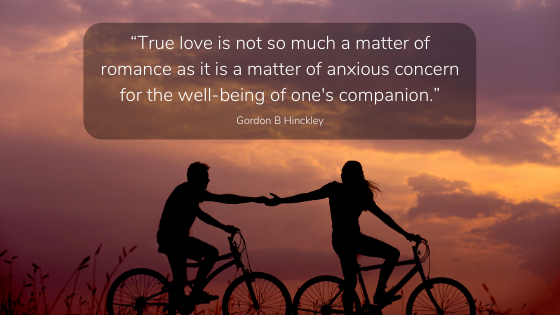
Unconditional Positive Regard (UPR)
In psychology, such unconditional love is known as unconditional positive regard (UPR), which can be defined as “the basic acceptance and support of a person regardless of what the person says or does.”5 UPR is often used to describe the way a therapist should interact with their client, but it can just as easily apply to marriage, parenting, and any other relationship.
There are two key aspects of UPR that you should understand in order to develop unconditional love for the people in your life: (1) The UPR Mindset, and (2) The Practice of UPR
The UPR Mindset
The first step in developing UPR is developing the right mindset: "It can be misunderstood as simply being nice to people—smiling at them and nodding. But it’s not about what you do. UPR is an attitude. Once a therapist gets the attitude, the behaviour that expresses that attitude will follow."6
There are three basic beliefs that make up the UPR mindset: (1) All People Always Have Good Intentions, (2) People are Separate From Their Behavior, and (3) People Have the Internal Resources Needed to Change.
1. All People Always Have Good Intentions
In the Emperor’s New Groove, Pacha is a poor farmer who in my mind is trying his very best to have a UPR mindset. His mindset is put to the test when emperor-turned-llama, Cuzco, acts as if the whole world revolves around himself with no regard for anyone else. In his greatest moment of frustration with Cuzco, Pacha loses his UPR mindset as he says: “Why did I risk my life for a selfish brat like you? I was always taught that there was some good in everyone, but, oh, you proved me wrong.”7

Not only does the UPR mindset require us to believe that there is some good in everyone, but it pushes us to the next level to believe that every person always has good intentions: "What it means is that you respect the person as a human being… and that no matter how dangerous or dysfunctional they seem to be, they are doing their best."8
2. People are Separate From Their Behavior
Now, you might be thinking, “How can I possibly believe that everyone is always doing their best? What about lazy people? What about serial killers? What about people who drive below the speed limit?!?” This leads us to the second key belief essential to the UPR mindset: people are separate from their behavior.
Deep down, every human has good intentions. These good intentions are then acted on by influences outside of that person’s control. Whether their behavior ends up being good or bad depends on which influences are currently acting on that person. In this way, all humans can always have good intentions despite the existence of bad behavior:
"Practicing unconditional positive regard means realizing that, even if a behavior seems unhealthy or maladaptive, the client may have simply been trying their hardest to deal with a difficult situation. For example, imagine that a therapist has a client who shoplifted. Shoplifting is not desirable behavior, but the therapist practicing unconditional positive regard would consider the fact that the client might have been facing difficult financial circumstances with few other options."9
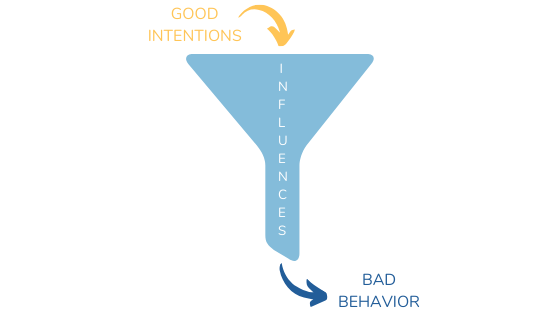
There are many influences that will determine whether one’s good intentions translate into good or bad behavior. Here are six of the most important influences to consider:
- Biology. Science reveals that much of our behavior is directly related to our genetic makeup. There are genes that will increase your chances of becoming a drug addict10, genes that will cause you to eat more than you should11, and even genes that increase risk-taking behavior such as sexual promiscuity, gambling, and speeding.12
- Needs. As humans, we all have needs13, and if one of these needs is not met, we will experience a strong drive to meet that need. Sometimes, if deprived of a need long enough, we are driven to meet our needs in unhealthy ways.
- Emotions. When we experience negative emotions such as stress, anxiety, or frustration, our frontal lobe, the part of our brain responsible for making good decisions, fails to function properly: “Even quite mild acute uncontrollable stress can cause a rapid and dramatic loss of prefrontal cognitive abilities.”14 Without a fully functioning frontal lobe, our good intentions can easily be warped into bad behavior.
- Unconscious. Some branches of psychology suggest that there are thoughts, urges, feelings, and memories that lie outside of our awareness. They live in the part of our mind known as the unconscious. For instance, if a child was abused at a young age, they most likely will not consciously remember what happened, but it will still influence their present-day behavior. Oftentimes, they may even re-create the abuse with someone else, whether as the abuser or the victim.15
- Social Environment. The relationships we have with other people will have a huge influence on our behavior, particularly when we belong to a group. Belonging to a group, especially at a young age, often results in our adoption of the culture of that group (the group’s values, behaviors, and beliefs). This can affect our very definition of “good” vs. “bad.” In this way, despite one’s good intentions, belonging to a bad group can result in a whole host of bad behavior.
- Physical Environment. Your physical environment influences your behavior, whether you are aware of it or not. Bigger plates cause us to eat more16, brightly lit rooms improve our moods17, and having a bigger driver’s seat can influence you to illegally park more often!18
As you can tell, there are many influences that can easily warp good intentions into bad behavior. Think of it like a game of telephone that always starts with good intentions. As the good intentions pass through each influence, they get warped and twisted, sometimes to the point that they become the opposite of good.
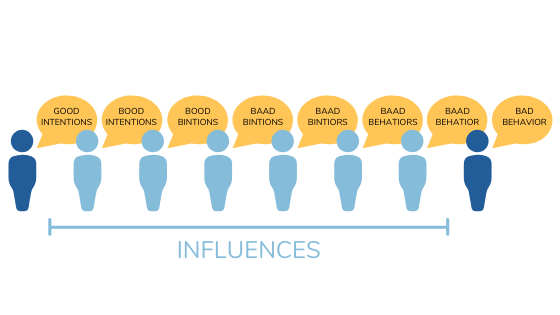
Now, some of you might be skeptical at this point, wondering, “Okay, I believe that there are influences that can warp good intentions into bad behavior, but how can I know that every human always has good intentions?” I wish there was a way to prove or disprove whether or not all humans have good intentions. But, there isn’t. What this means is that we must choose for ourselves whether we want to believe it or not, and if you want to have a UPR mindset, you need to believe it. Only once you believe that every human always has good intentions will you be able to fully separate behavior from the person who needs your unconditional love.
3. People Have the Internal Resources Needed to Change
The third and final aspect of the UPR mindset is the belief that people have the internal resources needed to change: "At the heart of the concept is the belief that every person has the personal resources within to help themselves, if they are only offered the environment of acceptance to foster their own recognition of this."19
Once you can accept the idea that everyone around you has the internal resources necessary to change themselves, you can stop trying to change them. This is crucial to having unconditional love for someone because if you are always trying to change them, it indicates that you are not accepting them for who they are at this moment. Unconditional love requires us to view everyone around us as being perfect, just the way they are. Their behavior may not be perfect. The influences acting on them may not be perfect. But who they are as a person is perfect.
Unconditional love requires us to view everyone around us as being perfect, just the way they are.
The Practice of Unconditional Positive Regard
Although adopting the UPR mindset can make putting unconditional love into practice more natural, it can still be easy to slip back into bad habits. It is important to be aware of what UPR looks like so that you can notice when your own behavior goes off course. You will know you are on the right track to practicing UPR if you are (1) Accepting, Not Judging (2) Influencing, Not Controlling, and (3) Hoping, Not Resigning.
Accepting, Not Judging
When you are practicing UPR, you will communicate acceptance to those around you. When someone shares something deeply personal with you, even when it is something you view as being bad, you will say things such as:
- “I can see why you feel that way.”
- “That must be so hard.”
- “Anyone would have done the same if they had been in your situation.”
- “You are totally normal.”
In contrast, judging comments reveal that you are currently struggling to practice UPR:
- “I can’t believe you would do that!”
- “Are you crazy?”
- “You really need to stop doing things like that.”
- “What you should’ve done is…”
Judging comments indicate that you do not trust that the other person’s intentions are good. The other person will no longer feel comfortable sharing deeply personal information with you because they know you will interpret it in a negative light. They need to trust that no matter what they share, you are going to see through to their good intentions.
Influencing, Not Controlling
Because other people have the internal resources needed to change, there is no need to control them. In fact, controlling behavior will have the opposite effect we are hoping for because in so doing, we are taking away another person’s sense of control, which leads them to feel increased stress.20 As discussed earlier, stress decreases frontal lobe activity, decreasing one’s ability to make good long-term decisions. For this reason, it is unlikely that our loved ones will make positive life changes when they feel like they are being controlled.
Attempting to control someone else is also shortsighted because it ignores the true cause of their behavior (i.e. the 6 influences). Although we might improve someone’s behavior in one realm, their behavior will surely slip in another since the influences causing bad behavior are still present in that person’s life (and we just added in the influence of stress).
For instance, let’s say your child is being disruptive because he needs love and attention. If you respond by threatening your child with a punishment, he might comply in the short term, but the need for love and attention is still acting on your child. And your child now feels the added stress of being controlled by someone else. With these two influences acting on your child, it is only a matter of time before their next outburst.

When we seek to influence others instead of control them, we get a much better result. You end up working with the person instead of against them. You understand that the good intentions are there, they are simply being warped by influences. Instead of trying to change the person, your focus is on understanding which influences are currently at play and addressing them head on.
When we seek to influence others instead of control them, we get a much better result.
For example, if your spouse is in a grumpy mood at the end of a long work day, instead of giving them advice about leaving work at work, or getting upset at them for their sour mood, you would seek to understand which influences are bringing your spouse down. You might ask, “It seems like you are stressed? Did you have a rough day at work?” Then you’d simply listen, accepting everything they say as being totally, 100-percent normal. “That’s so frustrating. I’m sorry that happened to you,” might be an appropriate response. After such a conversation, you will likely find that your spouse’s mood is dramatically improved. Oftentimes, when the major influence is emotions, people just need someone to listen with unconditional love, and their bad feelings will melt away.
As another example, let’s say your teenager is starting to hang out with the wrong crowd, and you are concerned about some of the new behaviors they are picking up. Instead of threatening them with increasingly-severe punishments, the practice of UPR would suggest finding a safe, non-controlling way to influence their behavior. You might consider what needs are being met by their friends that you could start meeting yourself. You might seek to create a stronger family culture at home, so that your child’s social environment influences them in a more positive way. All the while, you are accepting your child fully, showing them that you are a safe person for them to share their deepest feelings with.
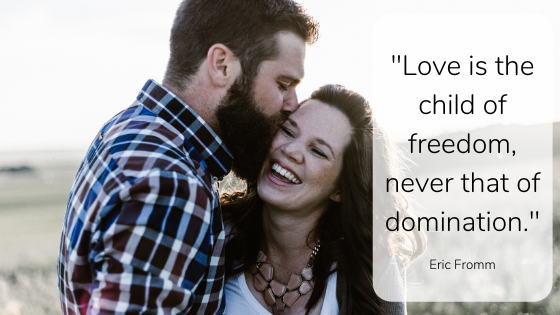
It is important to be aware of what controlling behavior looks like so that we can catch ourselves. Some of the easiest to slip into are nagging, giving unsolicited advice, blaming, threatening, using passive aggression, public shaming, generalizing, correcting, and comparing (See "100+ Tactics Used to Control, Manipulate, and Verbally Abuse").
You might be especially tempted to use one of these controlling behaviors when someone’s actions negatively affect you. While UPR requires us to accept another person fully, it does not mean we need to allow their bad behavior to hurt us. However, defending ourselves doesn't necessitate resorting to controlling behaviors.
A simple I-statement is a safe way to defend oneself while still showing full acceptance of the other person. For instance, “I feel frustrated when you leave your socks on the floor,” acknowledges the behavior without attaching it to the other person. On the other hand, saying something like, “Why must you always leave your socks all over the floor!?” is an example of generalization and creates a link between the person and their behavior, making them feel unaccepted and making it harder for them to distance themselves from the behavior.
Hoping, Not Resigning
When we truly believe that all people have good intentions and the resources to change, we can feel optimistic about the people around us: "At the heart of unconditional positive regard, then, is hope. The therapist, by putting aside their own biases, shows optimism that the client can create positive change for his or herself. They are more than what they have done."21
There is no reason to give up on someone if we are fully practicing UPR. If we are the victim of someone else’s bad behavior, we may need to distance ourselves from the behavior, but we can continue believing in their good intentions.
Benefits of Unconditional Positive Regard
Learning to practice UPR takes hard work and dedication. It is no easy task. But, it is worth every bit of effort. Practicing UPR will result in many benefits, including:
- More intimate relationships. “Intimacy means deeply knowing another person and feeling deeply known.”22 Your spouse and children need to feel completely comfortable opening up to you if you are ever going to have intimate relationships with them. When they know that you will receive everything they say with acceptance and love, they will not be afraid to share their deepest wishes, fears, and experiences with you (See "How Nonviolent Communication Completely Transformed My Relationships").
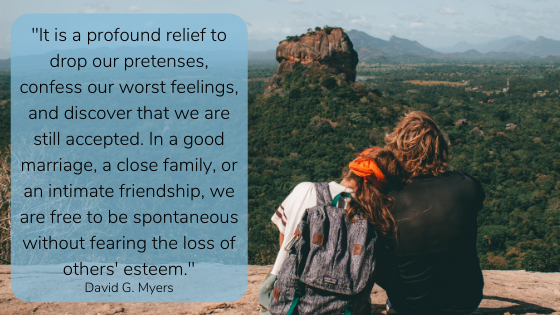
- Raising children who have self-worth. When your children know that they will be fully accepted and loved no matter what mistakes they might make, they will know of their self-worth: "Unconditional positive regard from caregivers during the early years of life can help contribute to feelings of self-worth as people grow older."23
- Becoming a stronger, more positive influence on others. The interesting thing about UPR is that once you stop trying to change the people around you, they will change themselves for the better. It has been proven that when therapists use UPR in their practice, their clients have better treatment outcomes.24 This is because UPR “provides the best possible conditions for personal growth to the client."25 When you radiate UPR, the people around you will grow.
- A greater feeling of connection with the people around you. When you start to see that everyone around you is a human with good intentions, you will feel a deep sense of belonging. Deep down, despite any bad behavior, we are all doing our best. How beautiful life is when we can truly believe that.
It Starts with Loving Yourself
So, now that you understand UPR and its benefits, you are likely eager to get started. I’d suggest taking it one step at a time, starting by practicing UPR towards yourself (like this woman did). A journal can be very helpful in this regard. Write down everything you are thinking and feeling at the end of each day and accept it fully. Look past any bad behavior, and start seeing yourself as the perfect person you are (See "How to be Happy Right NOW").
Hi fellow human! Thanks for visiting my personal blog. I’m an intentional family man who is currently passionate about parenting, family culture, homeschooling, and self improvement. This blog isn’t a business. It’s just my way of connecting with people with just as much passion for these topics as me. So, if you enjoy my musings, be sure to reach out.
- “Infatuation” by Your Dictionary
- ”Infatuation” by Collins Dictionary
- ”Infatuation” by Merriam-Webster
- ”“Except the Lord Build the House…” by Gordon B. Hinckley
- ”Unconditional Positive Regard” by Wikipedia
- "Unconditional Positive Regard" by Wikipedia
- Emperor's New Groove by Disney
- "Unconditional Positive Regard" by Stephen Joseph
- "Unconditional Positive Regard" by Elizabeth Hopper
- ”Genes Matter in Addiction” by American Psychological Association
- ”Other Factors in Weight Gain” by CDC
- ”Large Study Identifies Genetic Variants Linked to Risk Tolerance and Risky Behaviors” by UC San Diego Health
- ”Maslow's Hierarchy of Needs” by Sam McLeod
- ”Stress signalling pathways that impair prefrontal cortex structure and function” by Amy F. T. Arnsten
- ”A Helpful Way to Conceptualize and Understand Reenactments” by Michael S. Levy, Ph.D.
- "Portion Size Me Study" by Brian Wansink and Koert Van Ittersum
- ”What Impact Does the Environment Have on Us?” by University of Minnesota
- ”The ergonomics of dishonesty: the effect of incidental posture on stealing, cheating, and traffic violations” by Yap AJ, Wazlawek AS, Lucas BJ, Cuddy AJ, and Carney DR
- "Unconditional Positive Regard -What It Is and Why You Need It" by Sheri Jacobson
- ”Sense of Control Predicts Depressive and Anxious Symptoms Across the Transition to Parenthood” by Courtney Pierce Keeton, Maureen Perry-Jenkins, and Aline G. Sayer
- "Unconditional Positive Regard - What It Is and Why You Need It" by Sheri Jacobson
- ”The What and How of True Intimacy” by Marie Hartwell-Walker
- "Unconditional Positive Regard in Psychology" by Kendra Cherry
- "Positive regard and psychotherapy outcome: A meta-analytic review" by Farber, B. A., Suzuki, J. Y., & Lynch, D. A.
- "Unconditional Positive Regard" by Wikipedia

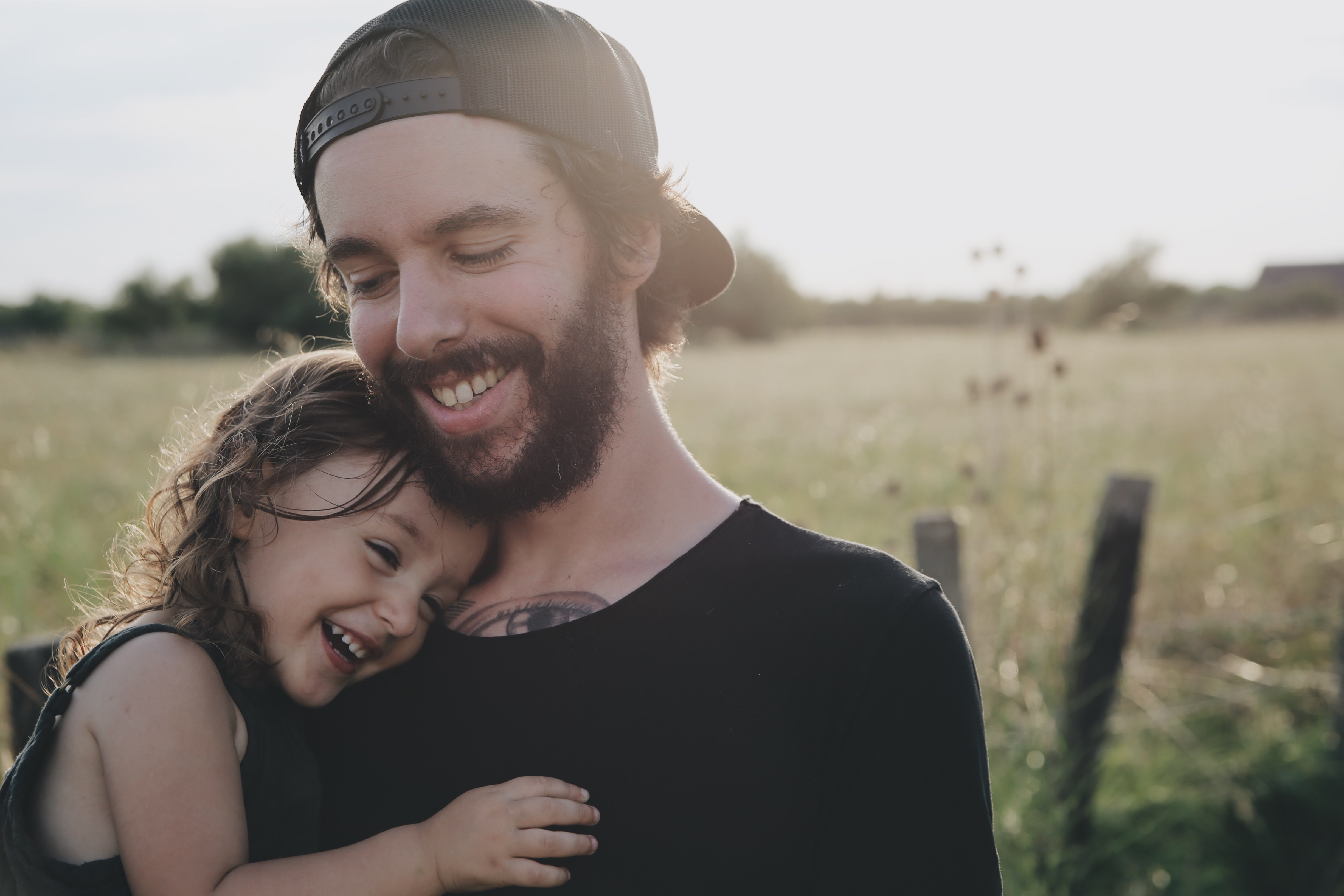
2 comments to “How to Develop Unconditional Love: A Scientific Approach”
Corina - February 14, 2024
Thank you deeply for sharing your ideas! Tonight I fed my soul and my mind with every word .
Andrew Benjamin George - February 15, 2024
Aw thanks! Makes my day to hear how much my words made a difference for you. 🙂